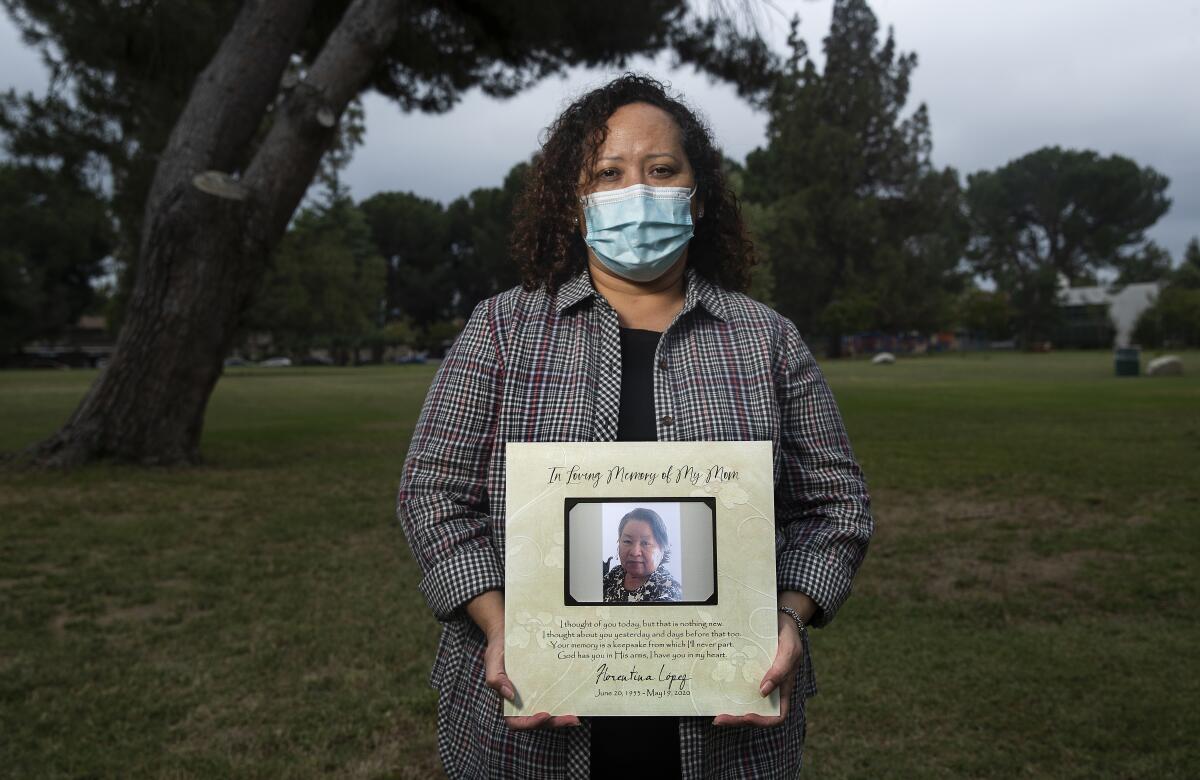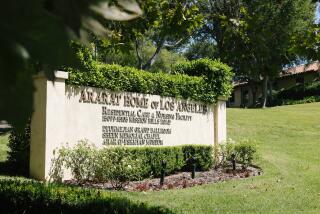Column: After a nursing home patient died of COVID-19, her daughter fought back

- Share via
It all happened so fast.
On May 12, Griselda Nava of Arleta went to Parkwest Rehabilitation Center in Reseda to take lunch to her mother, who had lived at the facility since suffering a stroke in 2012. A staff member told Nava that her mother, Florentina Lopez, was not feeling well. A nurse said it might be a urinary tract infection, but the situation was not serious.
On May 15, a nurse supervisor told Nava her mother was fine.
On May 18, Nava got a call from the daughter of one of her mother’s roommates saying she believed Nava’s mother had been taken to the hospital. On her way to Parkwest to find out for sure, Nava received a call from an emergency room doctor informing her that her mother was very ill. Two hours later, the same doctor told her that her mother had COVID-19 and had suffered a heart attack.
On May 19, Florentina Lopez, 66, died at the hospital.
“We can’t even give her a formal funeral service,” said Nava, who was barred from being with her mother in her final days and whose grief is as deep as her anger at the circumstances of her mother’s death.
The allegations above, contained in a wrongful death lawsuit filed against Parkwest last week, come as COVID-19 is still spreading through nursing facilities statewide. According to Los Angeles County Public Health Department records, 23 Parkwest employees and 16 patients at the 98-bed facility have tested positive for COVID-19.
As of Monday, the death toll there was at six.
“Through April and May ... Parkwest’s leadership learned that multiple members of its staff tested or were suspected of having COVID-19 yet did not inform residents or their families and continued to allow staff to work,” said the lawsuit filed by attorney Scott Glovsky, who also alleged that Parkwest did not provide protective equipment for staff “through as late as May.”
Parkwest’s owner, Crystal Solorzano, was named as a defendant in the lawsuit. She did not respond to my multiple requests for comment. The Medicare.gov website, where nursing home data can be found, gives Parkwest a one-star rating (out of a possible five), which it describes as “much below average.” The ratings are based on criteria such as health inspections, staffing and quality of care, and the Parkwest assessment details numerous deficiencies.
Florentina Lopez was but one more casualty in the mounting, scandalous toll of captive elderly patients killed by the virus. About 28,000 nursing home residents and employees have died nationwide. In California, nearly 2,000 residents of skilled nursing facilities have died, along with more than 60 employees, accounting for about 43% of the state’s total deaths.
Glovsky, who sued a Glendale nursing home last month in the COVID-19 death of a 77-year-old patient, said that traditionally, three things have helped keep the nursing home industry in check, and all three are threatened at the moment.
The first is family visits, which allow relatives to monitor care. Since COVID-19, family visits have been sharply curtailed or banned. The second is rigorous monitoring and enforcement, but critics have long alleged there isn’t nearly enough oversight. And the third is lawsuits, but the industry is throwing its considerable weight around in California and nationwide, lobbying for liability protection.
From the beginning of the pandemic, it has seemed to me that there’s been a collective shrug about our vulnerable elders dying — often without loved ones nearby — as if these lives are disposable. These are often very old and sick patients, and the coronavirus stalks those demographic groups. But that doesn’t excuse the tragedy of so many senior deaths as public officials have haggled, unconscionably, over the details of whether and how to make testing in such facilities mandatory.
Although countless nursing homes are well-run and staffed by dedicated, even heroic employees, the state has done far too little to sanction operators with sketchy records, said Michael Connors of California Advocates for Nursing Home Reform.
“The California Department of Public Health rolled out the welcome mat long ago to bad actors and now nursing home residents are paying the price with their lives,” said Connors.
When I saw in the lawsuit that Parkwest’s owner was Crystal Solorzano, I did a quick check, and her name popped up in recent news accounts from the Bay Area. Turns out she is also the owner of Orinda Care Center, where 40 residents and 31 employees have tested positive for COVID-19 and several deaths have been reported.
In all, Solorzano is also listed in state records as the full or part owner of 11 facilities throughout California, eight of them in the counties of Los Angeles, Riverside, San Bernardino and Orange.
“She’s been on our radar for a long time,” said Molly Davies, vice president of L.A.’s elder abuse prevention and ombudsman services, who told me she has discussed patterns of care at Solorzano facilities with state health officials.
In addition to the 11 nursing homes she owns, Solorzano is affiliated with at least nine other facilities in California, according to state records. It’s not unusual in the nursing home industry, Connors said, for a party to buy a facility under an interim agreement while applying to the state to be the official licensed owner, a process that can take months or years.
In the case of the nine nursing homes, Solarzano indicated on state applications that she had taken financial charge of the facilities and sought a change of ownership from the state health department. In letters dated April 24, the state denied all nine of her applications, but she has appealed that decision and can legally operate them during the appeals process.
“NOTICE OF DENIAL OF APPLICATION,” said one such letter, regarding ownership of a Porterville facility, from the state.
“In or around July 2008, you submitted fraudulent documents to obtain your nursing home administrator license,” said the letter, which noted that Solorzano’s administrator license was revoked in 2019 but remains active because she has also appealed that decision by the state.
The letter went on to say that a state health department review “revealed 128 federal regulatory violations” at facilities she “owned, managed, or operated, directly or indirectly” in the three years ending in February.
Over that same period, the letter stated, violations of state regulations included 34 citations for violations that had “a direct or immediate relationship to patient health,” 16 citations for “imminent danger of death or serious harm” and one citation for “direct proximate cause of death of a patient.” And the state said there were three penalties for failure to comply with mandated minimum staffing requirements.
In an interview with ABC-7 News in San Francisco in mid-April, Solorzano expressed her condolences over the loss of lives at her facility in Orinda. In mid-May the station reported that Solarzano had emailed a statement disputing the allegations against her in the state letters denying her ownership licenses. Her statement said in part:
“The allegations in the CDPH letter you reference are false. There will be a hearing in September on the matter and we will publicly respond to these baseless allegations at the appropriate time. Our only focus now is maintaining the health and safety of our residents.”
Kate Folmar, a spokeswoman for the state Health and Human Services Agency, said that in regard to Solorzano, the health department “has taken every action available to us under state law in this situation.”
She passed along the following from a department staffer:
“Under California law, a new operator can assume operations of a SNF [skilled nursing facility] using a Management Operations Transfer Agreement (MOTA) and that new operator can continue to operate under the MOTA until an appeal of a change of ownership denial is heard and resolved. An operator does not need to have a NHA license in order to own/operate a SNF.”
You can continue to own and operate a nursing home the state doesn’t think you’re qualified to run as long as you’re appealing the state’s decision?
Maybe that’s part of the problem.
“Can you imagine the uproar if the state allowed school bus drivers to keep driving students after losing their licenses due to fatal accidents?” Connors asked.
On Monday, Connors’ group released a 10-point reform plan to overhaul the state’s nursing home industry, charging that understaffing and “toothless enforcement” allowed COVID-19 to cause “unprecedented devastation and tragedy.”
Griselda Nava told me she made multiple complaints to management about her mother’s care at Parkwest. She said she complained that her incontinent mother, who worked as a seamstress and in a slaughterhouse before suffering a stroke at age 59, did not receive proper hygiene care, including diaper pads, and that a male assistant sometimes handled personal hygiene care, despite Nava’s repeated requests for a female aide, allegations also made in the lawsuit.
Nava said the days since her mother’s death have brought little relief. Ironically, she’s been studying to become a nurse because she knows through her mother’s experience how important it is for patients to have someone be there for them in their hours of need.
“I wake up angry every morning,” she told me.
More to Read
Sign up for Essential California
The most important California stories and recommendations in your inbox every morning.
You may occasionally receive promotional content from the Los Angeles Times.











